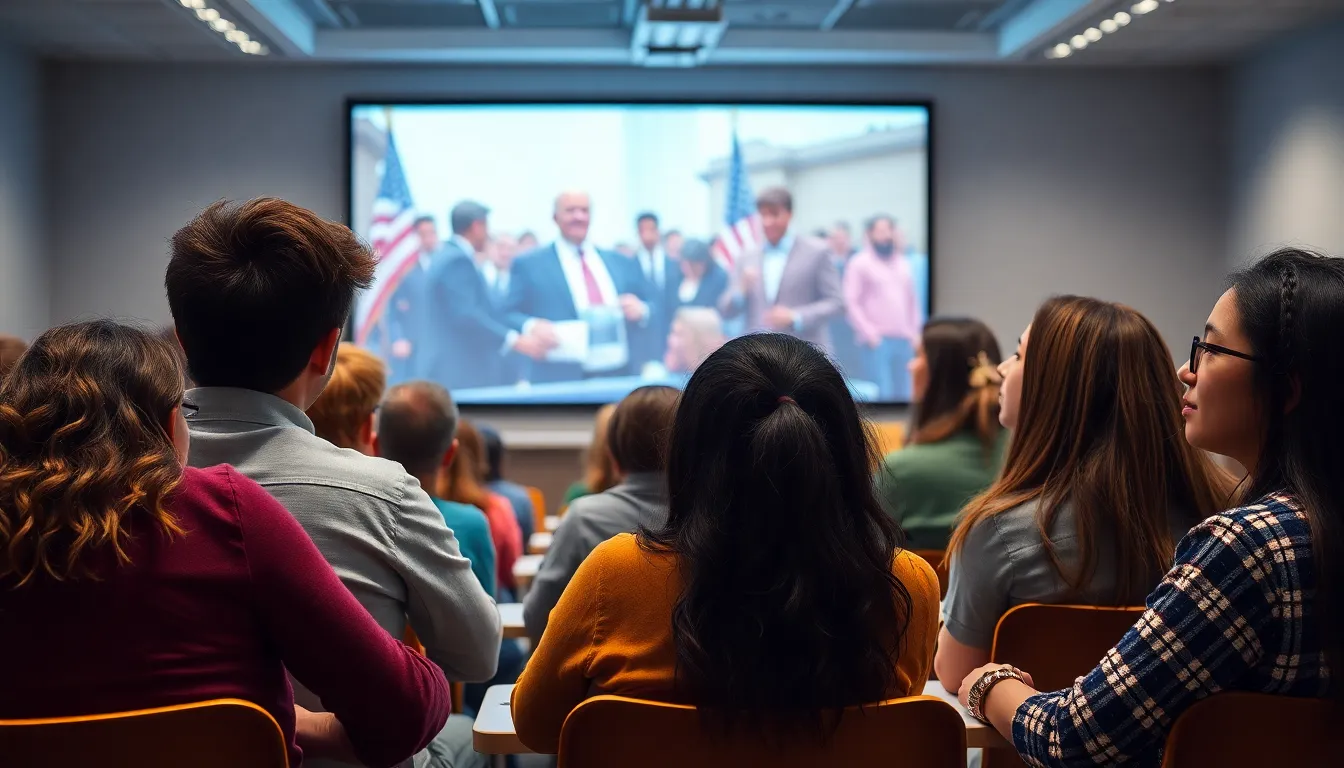In a world where political drama often rivals the best soap operas, political documentaries offer a front-row seat to the real-life twists and turns of power. These films peel back the curtain, revealing the chaos, the triumphs, and the sometimes bewildering antics of those in charge. Whether it’s a deep dive into a controversial election or a humorous take on political missteps, these documentaries serve up a cocktail of facts and entertainment that keeps viewers on the edge of their seats.
Imagine watching a gripping thriller where the stakes are high and the plot is packed with unexpected turns, all while learning about the forces shaping society. Political documentaries are the perfect blend of education and entertainment, proving that sometimes the truth is stranger (and funnier) than fiction. So grab your popcorn and get ready to explore the fascinating world of politics through the lens of these captivating films.
Table of Contents
ToggleOverview of Political Documentaries
Political documentaries offer viewers an insightful examination of real-world events and figures. They focus on various topics such as elections, governance, and social movements. By exploring these themes, documentaries provide critical perspectives on political dynamics.
The storytelling techniques used in political documentaries can both educate and entertain. Many films incorporate interviews, archival footage, and expert commentary to present a balanced view of complex issues. Engaging narratives often highlight the struggles and achievements of political figures.
Documentaries like “13th” and “Fahrenheit 9/11” showcase specific societal challenges. These films dissect systemic racism and the ramifications of political decisions. Viewers gain a deeper understanding of historical contexts and contemporary implications.
Other notable documentaries analyze the impact of political propaganda. Films such as “The Fog of War” offer reflection on decision-making processes during wartime. Conversations with key figures enhance the storytelling, leaving audiences with thought-provoking questions.
The appeal of political documentaries lies in their ability to foster discussion. They serve as springboards for debates among friends, family, and communities. Audiences often find themselves considering multiple viewpoints and reassessing their beliefs.
Beyond traditional distribution channels, streaming services have increased accessibility to these films. Viewers can easily find a wide variety of documentaries catering to diverse interests. As interest in political matters continues to grow, documentary filmmaking remains a vital medium for understanding the world.
Importance of Political Documentaries

Political documentaries shape public understanding of key issues. They present multifaceted narratives that resonate with viewers on emotional and intellectual levels.
Impact on Public Opinion
Political documentaries influence public perception significantly. These films often highlight underrepresented voices and challenges, allowing individuals to connect with new ideas. Engaging storytelling helps audiences understand complex political landscapes, prompting changes in attitudes. Viewers can reassess their beliefs based on compelling evidence and analysis provided by these documentaries. Studies show documentaries like “Fahrenheit 9/11” can shift opinions, especially during elections. By presenting facts and emotional appeals, these films stimulate discussions in households and communities. Ultimately, they act as powerful tools for awareness and change.
Role in Education and Awareness
Educational institutions increasingly use political documentaries in curricula. Such films promote critical thinking and discussions on democracy, governance, and social justice. Teachers can leverage visually engaging content to explain complex historical events and political theories. Documentaries make abstract concepts concrete, fostering a deeper understanding among students. By incorporating documentaries into learning, educators create opportunities for students to explore diverse perspectives. Resources like “13th” shed light on significant societal issues, informing audiences about systemic racism in America. As a result, these documentaries contribute to increased civic engagement and informed citizenship.
Notable Political Documentaries
Political documentaries offer a unique lens on significant events and movements, influencing public discourse and understanding.
Documentaries That Changed the Landscape
“Fahrenheit 9/11” ignited discussion around the U.S. response to the 9/11 attacks, prompting viewers to question government narratives. “13th” tackled systemic racism, revealing how legislation perpetuates inequality in the justice system. “Bowling for Columbine,” through its exploration of gun violence, challenged perceptions about American culture and policy. “The Act of Killing” provided chilling insights into Indonesia’s mass killings, showcasing the complex interplay of memory and atrocity. These films not only inform viewers but also encourage critical reflection on societal issues, often reshaping conversations in both media and personal discussions.
Emerging Voices in Political Documentary Filmmaking
Directors such as Ava DuVernay and Rory Kennedy have emerged as influential voices in political documentary filmmaking. DuVernay’s work highlights the intersection of race and justice, while Kennedy often focuses on social and humanitarian issues. New filmmakers leverage technology to present fresh perspectives on old narratives, making documentaries more accessible. The rise of platforms like Netflix has enabled diverse topics to reach wider audiences. This new wave of filmmakers provokes thought, inviting innovative discussions on democracy and identity, ultimately enriching the genre’s landscape.
Techniques Used in Political Documentaries
Political documentaries employ various techniques to engage viewers and convey complex ideas.
Cinematic Approaches
Cinematic techniques enhance the emotional impact of political documentaries. Many filmmakers use striking visuals to capture attention and evoke strong reactions. High-quality cinematography presents compelling images that resonate with audiences. Techniques like slow-motion, aerial shots, and intimate close-ups immerse viewers in the narrative. Sound design also plays a crucial role; it underscores key moments and heightens tension. Moreover, strategic editing can create suspense or emphasize critical arguments, encouraging audiences to reflect on important themes.
Storytelling Methods
Storytelling methods form the backbone of effective political documentaries. Many films rely on interviews to present diverse perspectives, allowing individuals to share personal experiences related to political issues. Archival footage often serves to provide historical context and evidence, enriching the narrative. Others might employ narrative arcs that follow a character or event over time, creating a sense of connection. Thoughtful structuring helps reveal complexities, often leading to unexpected revelations that challenge viewers’ assumptions. Each approach fosters deeper understanding and engagement with pressing societal concerns.
Challenges in Political Documentary Filmmaking
Political documentary filmmaking faces significant challenges, encompassing ethical dilemmas and the need to balance perspectives while presenting complex narratives.
Ethical Considerations
Ethical considerations remain paramount in political documentaries. Filmmakers often grapple with issues like accuracy, representation, and the impact of their work on subject matter. Ensuring the truthfulness of portrayed events involves rigorous fact-checking and a commitment to integrity. Documentaries that misrepresent information can influence public perception negatively. Additionally, filmmakers must navigate the line between advocacy and impartial reporting. Recognizing the voices of marginalized communities requires ethical sensitivity to avoid exploitation. Understanding the ramifications of their portrayal can inform a filmmaker’s approach and enhance audience trust.
Balancing Subjectivity and Objectivity
Balancing subjectivity and objectivity presents a unique challenge for filmmakers. Documentaries often reflect personal viewpoints that shape narratives; thus, maintaining a fair representation of multiple perspectives is crucial. Filmmakers strive to present facts alongside emotional and personal stories. Including diverse voices can mitigate bias and foster a well-rounded understanding of complex issues. Audiences benefit when documentaries acknowledge subjective viewpoints while providing contextual facts. Striving for balance allows viewers to engage critically with the material, prompting deeper discussions about the topics presented.
Political documentaries serve as a powerful medium that not only informs but also engages audiences in vital conversations about governance and societal issues. By blending storytelling with factual narratives they challenge viewers to rethink their perspectives and understand the complexities of political landscapes.
As access to these films continues to grow through various platforms they remain essential tools for education and civic engagement. The unique ability of documentaries to spark dialogue and encourage critical thinking ensures they’ll play a crucial role in shaping public discourse for years to come. Embracing the insights offered by these films can lead to a more informed and active citizenry.





